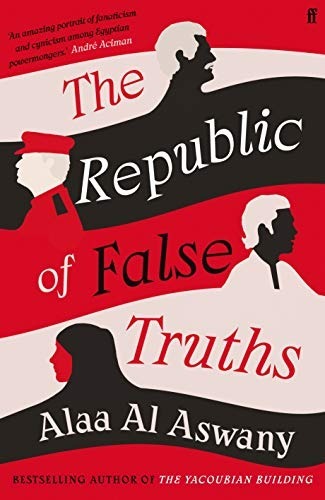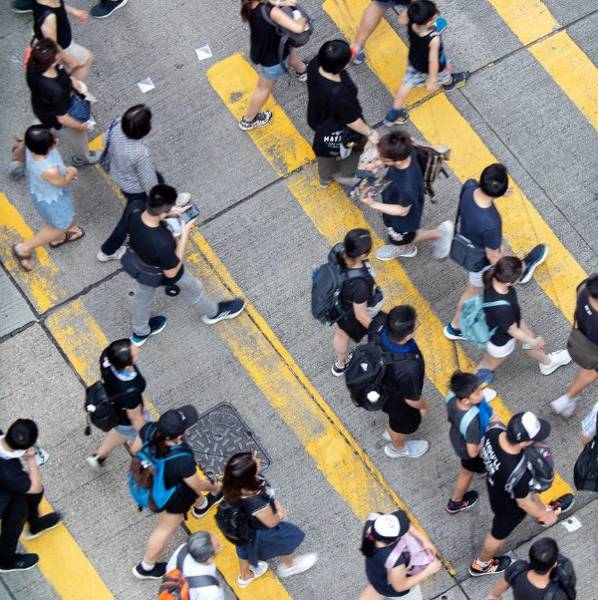
The Republic of False Truths (Penguin Random House) by Alaa Al Aswany.
“Most Egyptians have no idea how to think for themselves. The Egyptian people is like a child: if you leave it to decide for itself, it will do itself harm.” So speaks General Ahmad Alwany in the Egyptian novelist Alaa Al Aswany’s The Republic of False Truths. It is 2011 and the revolution has begun: the people have finally decided for themselves. Egyptians from different backgrounds have gathered in Cairo’s Tahrir Square to peacefully demonstrate against government corruption and police brutality, in an uprising which ultimately led to the resignation of President Hosni Mubarak after 30 years in power. The Republic of False Truths captures the uneasy emotions of a society mid-change: the idealism of youth, the ambivalence of the majority, and the machinations of the powers-that-be.
The novel begins as Alwany awakens to the dawn prayer. “He’d lie on his back in bed, eyes open, repeating the words of the call in a whisper.” While a faultlessly observant Muslim – teetotal, married, charitable – he allows himself certain pleasures: luxurious breakfasts, expensive clothing and adult entertainment. “Some might ask, ‘How could a God-fearing Muslim like General Alwany watch pornographic films?”’ the narrator poses, sarcastically.
Far worse is what Alwany allows in support of the regime. From the mosque, he heads straight to a darkened room where he leads in the torture of a young dissident. Al Aswany’s main target is religious hypocrisy, and the sheen of rectitude it gives to the unscrupulous. The novel supplies a cast of contemptible graspers. Sheikh Shamel, the fraudulent host of the Godliness Channel, and Nourhan, his exploitative co-host, are the two most obvious hucksters – but also under fire are the petty-minded wives and businessmen with interests to protect.
A large part of the heat generated by this impassioned novel comes from the friction of cross-generational conflict. Alwany’s beloved daughter Danya becomes involved in the protests through her relationship with the lower class Khaled. Many pay the price for reaching out a hand in friendship, as the aristocratic character Ashraf observes: “In Egypt, a person inherits his circumstances and it’s very difficult for him to change them.” The revolution marks a wilful change, a levelling of societal barriers.
The Republic of False Truths contains multiple love stories. Sadly, when the romantic mood takes him Aswany rather lets himself down. Meaningful relationships we are meant to invest in are expressed in bland exposition or overripe sentiment: “Ikram pouted her delectable lips...She had now become unbearably sexy.” There is a persistent lustfulness which often veers into crudity. This could, in part, be down to the translation, which is often flat and limited with certain phrases appearing all too regularly (“Silence reigned” is a great favourite).
These defects are made up for by an unflinching account of the horrors perpetrated by the authorities. The testimonies of female protestors forced to undergo humiliating “virginity tests” appear in stark succession – written in demotic speech, they are spine-chillingly intimate. So too, the brutal treatment of other peaceful protestors. Aswany is unsparing in his rendering of the violent chaos that ensues when the armed forces attempt to put down the revolution.
The broad cast of characters offers a panoptic view of Egypt in flux, caught between its past and its many possible futures. It goes without saying which side Aswany is on (he furnishes a fine rogues gallery of counter-revolutionaries). It is less certain which side the majority of Egyptian people are on. Aswany hints at the delicate confusion of ordinary workers who veer between support and regret, but never truly hears them out. We remain in the company of aristocrats, politicians and university students.
The Republic of False Truths is a vivid re-telling of an event which ought not to be glossed over. It is biting in its satire of the crooked, and effusive in its sympathies for the brave: an engrossing wide-lens portrait of Egyptians thinking, acting, and speaking, for themselves.
This article is from the New Humanist autumn 2021 edition. Subscribe today.

